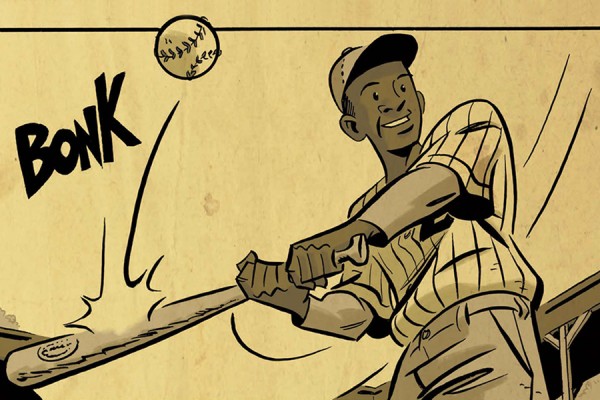 Images by cartoonist Scott Chantler are part of a collection celebrating the Chatham Coloured All-Stars, the first black team to win an Ontario Baseball Association provincial championship.
Images by cartoonist Scott Chantler are part of a collection celebrating the Chatham Coloured All-Stars, the first black team to win an Ontario Baseball Association provincial championship.
An important piece of Canadian history is now accessible to the public thanks to the launch of Breaking the Colour Barrier: Wilfred ‘Boomer’ Harding and the Chatham Coloured All-Stars (1932-1939) Project, which premiered at an open house in Chatham on Saturday. More than 350 community members attended.
The project, coordinated by UWindsor librarians Heidi Jacobs and Dave Johnstone, and history professor Miriam Wright, documents and celebrates the legacy of the Chatham Coloured All-Stars, the first black team to win an Ontario Baseball Association provincial championship in 1934.
The project is based on scrapbooks compiled by Boomer Harding’s daughter-in-law Pat Harding. Over the past two years, the researchers digitized these materials and oral histories with friends and family of the 1930s team. The website also contains a timeline documenting newspaper coverage of the 1934 season, educational resources based on the Ontario curriculum for Grades 1 to 12, and galleries of related images.
The research team also launched displays in the Chatham Sports Hall of Fame, a cartoon by Scott Chantler, and an eight-panel travelling exhibition. The project’s website is now live at cdigs.uwindsor.ca/BreakingColourBarrier/.
Dr. Wright says there is little written about Canadian black sports history, and outside of Chatham, few people know about Harding or the Chatham Coloured All-Stars. She says sports are a reflection of society and show the same struggles, conflicts and divisions found in daily life. Despite their athletic successes, Harding and his All-Stars teammates regularly faced discrimination both on and off the field.
“It’s important to acknowledge Harding’s story and that of the Chatham Coloured All Stars, because people often assume these types of racial barriers never existed in Canada,” Wright says.
The researchers partnered with the Chatham Sports Hall of Fame and used a $72,500 Ontario Trillium Foundation grant to develop the program and digitize fragile historical documents to make them accessible to future generations.
“This is a rare opportunity for local history enthusiasts, students, and seasoned researchers to learn about Boomer’s life, which is not just a story about sport, or race, but an intersectional narrative of human struggle and perseverance,” says Dr. Jacobs.
